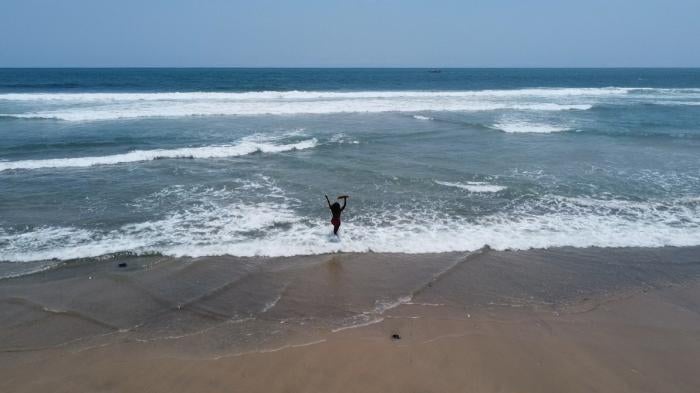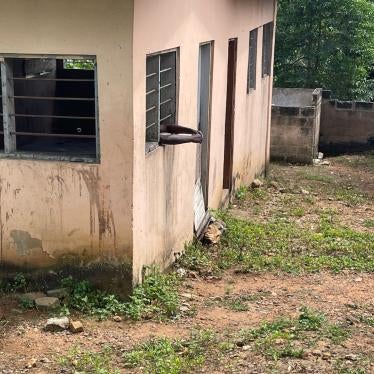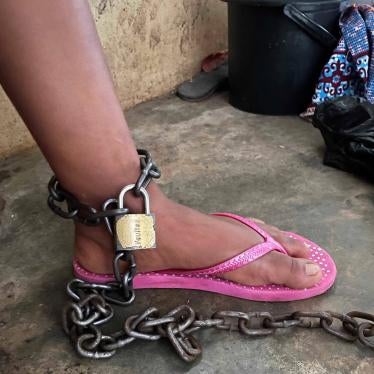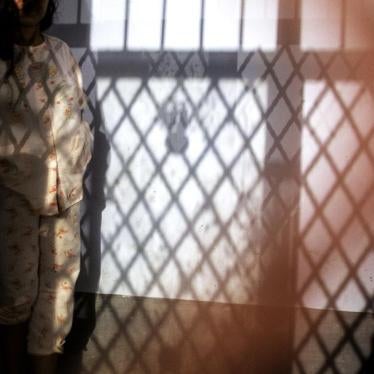(Accra, 5 décembre 2023) – Le gouvernement ghanéen devrait fournir des services de santé mentale fondés sur les droits et un soutien adéquat en matière de logement, de vie indépendante et de formation professionnelle pour les personnes présentant des troubles de santé mentale, a déclaré Human Rights Watch aujourd'hui, à l'approche du 75ème anniversaire. de la Déclaration universelle des droits de l'homme le 10 décembre 2023. Human Rights Watch a diffusé une vidéo montrant trois personnes précédemment enfermées en raison d'un trouble de santé mentale, et qui soulignent l’importance de la liberté et de l'indépendance en tant que facteurs ayant accéléré leur rétablissement.
Human Rights Watch a constaté que des familles ghanéennes emmènent souvent des personnes présentant des troubles de santé mentale, ou handicaps psychosociaux, réels ou perçus, chez des guérisseurs religieux ou traditionnels. Ceci est parfois dû aux croyances largement répandues selon lesquelles ces handicaps seraient causés par une malédiction ou de mauvais esprits, ou au fait que leurs communautés disposent de services de santé mentale limités, voire inexistants. Selon l’Autorité ghanéenne de santé mentale (Mental Health Authority), il existe plus de 5 000 « camps de prière » et centres de guérison traditionnelle à travers le pays. Les établissements psychiatriques manquent également de personnel ; dans de nombreux cas, ils sont en mauvais état et continuent de recourir à des traitements forcés.
« Avec un soutien et des services gouvernementaux appropriés, ainsi que des campagnes de sensibilisation pour lutter contre la stigmatisation, les personnes atteintes de troubles de santé mentale peuvent vivre une vie pleine et indépendante, plutôt que d’être enchaînées ou de languir dans dans des lits d'hôpitaux », a déclaré Elizabeth Kamundia, directrice adjointe de la division Droits des personnes handicapées à Human Rights Watch. « Le Ghana a l’occasion de démontrer que les droits humains sont effectivement universels en sensibilisant le public aux questions de santé mentale, et en investissant dans les services communautaires. »
Au cours de la dernière décennie, Human Rights Watch a visité plus d’une douzaine de camps de prière et a documenté des cas de personnes atteints de handicaps psychosociaux qui étaient enchaînées pendant de longues périodes, certaines pendant des années. Au-delà de la privation de liberté, ces personnes ont enduré d’horribles abus, des conditions insalubres, un manque d’hygiène et un manque d’accès aux soins de santé.
Le gouvernement ghanéen devrait prendre un certain nombre de mesures pour remplir ses obligations en vertu du droit international des droits humains. L'Autorité de santé mentale devrait faire respecter l'interdiction de la pratique de l’enchaînement (« shackling ») en fournissant les ressources nécessaires aux comités qui surveillent ces établissements, et renvoient certains cas au nouveau Tribunal des affaires de santé mentale.
Texte complet en anglais : en ligne ici.
………..









